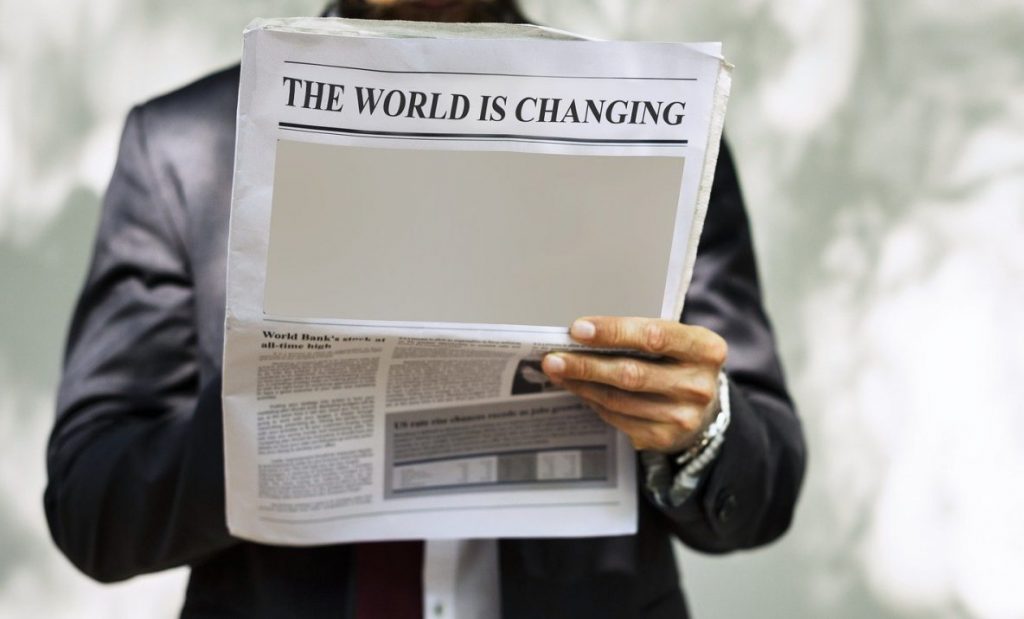
We are almost two months into the Coronavirus crisis since the WHO declared it a global health emergency on January 31st. By now, we are officially dealing with a global pandemic, which has become personally tangible to many of us. Around the world governments have been declaring a state of emergency, in Europe most borders are closed, public institutions and businesses have paused their operations, and people are urged to stay at home. Even measures of social distancing are being toughened and, one by one, big European cities are going on total lockdown.
It is a peculiar situation in which we should all avoid direct human contact, and substitute it with another reality – we have to move more of our lives online. If you allow me some imagination of how the current situation might evolve, we can get a pretty good preview of an ’online’ world, both the dystopian and utopian versions of it.
The dystopian post-Coronavirus version of an ’online’ world is the one where ’keeping the distance’ has proved right… As such, all jobs are done remotely, food is ordered and delivered with no human contact, we listen to the opera on our computers, parties are held in ZOOM or Google Meets platforms, we attend schools and universities from our couches, and we reach out to friends and family using social media. Ongoing innovation and automatization furthers this dystopian society, where human connection is digitalized and only robots are entrusted with physical contact…
In the utopian post-Coronavirus version of the world, we are left with all the good consequences of the current crisis. Specifically, all meetings that ’could have been a simple email’ actually become emails, lower levels of consumption continue to keep the waters of the Venice canals clean, people spend much more time in nature, and reading books continues to top common leisure activities. Moreover, genuine human connection, creativity of our minds, and a culture of sharing become significant marks of such a utopian world.
Naturally these two visions of the world are still far from reality. Luckily, the dystopian scenario seems to fail the test, as we all experience a longing for actual human connection and contact, which cannot be fully substituted by online interaction. On the other hand, the utopian world of ’reduced consumption’ fails to take the economy into account…
What could be more grounded expectations of post-Coronavirus changes then?
I for one think that the current crisis will result in more opportunities for flexible and remote work in the future. After all, the current mode of working will enable more learning about what meetings should indeed remain ’emails’, what kind of tasks can be done easily from a distance, and where and when we should still cherish actual physical interactions. I also believe that the current crisis will allow us all to grow our digital capabilities, increase technological proficiency (heck, maybe even reverse tech mentoring may become a thing of the past!) and expand our behavioural repertoire – even if we go back to more face-to-face work practices in the near future. And the crisis may also provide another impetus to rethink our current work designs and work practices – which continue to seem awfully outdated.
Apart from more flexibility in working modes, governments and businesses will be most probably pressured to reassess and improve their healthcare initiatives. Wouldn’t we all feel more comfortable and safe knowing that neither ourselves nor our neighbours and co-workers have to go to work, while sick?!
I would also expect – well, hope – to see a post-Coronavirus world stimulate governments, businesses, public organizations and, in fact, every individual to reassess the ways in which we consume, and add the needed inspiration and impulse for big-scale and long-lasting changes towards nature conservation.
Finally, as societies I hope we can retain the revived communal spirit of responsibility, empathy and care, as well as an appreciation for the simple things in our lives.


The current crisis has broken down the proper organization of many companies. There will certainly be many changes at the management and work organisation level, including remote working and the possibility for companies to operate despite legal restrictions. Entrepreneurs should pay more attention to ensuring compliance with law and ethics. We can also expect more internal policies and procedures. It is a pity that for such changes a crisis and suffering of many people are needed.
Coronavirus has proved to us that everything around us is so temporary. Things our lives revolved around – work, gym, malls, movies, society have all gone for a toss as we learning to live without them. it has taught us at the end, it’s your own home and family that keeps you safe.
Congrats for this article. It’s an intelligent point of view of the current situation.
I also think this will change the way we do certain things and most of these changes will have a positive impact on the way we do business.
I think innovation is a must in companies of all sectors, even the construction industry where I belong needs some changes and adjustments.
Regards.
Certainly the current crisis teaches us a lot and changes us. But will it become again as before? And do we want it to go back to the way it was before? Or will we always change our actions a little bit with this crisis?